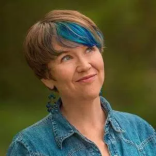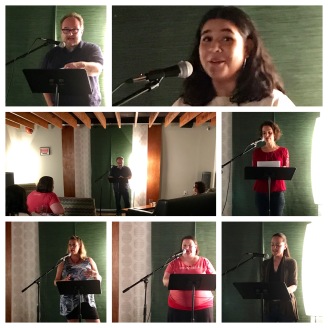 In 2011, I completed my MFA in Creative Writing (Fiction), at Converse College. I was excited, I was exhausted, and I had no idea what came next. I didn’t know how scary it would be to write after graduation, with no faculty mentor to tell me everything I was doing wrong or that I had accidentally given my character three arms. (True story!) I didn’t know how much I’d miss the community of writers that met twice a year for residency. All I really knew for sure was that those graduation robes are hot, nobody looks good in those mortarboard hats they make you wear, and my eighteen month old was decidedly not impressed with my brand-spanking new graduate degree and wanted to go home.
In 2011, I completed my MFA in Creative Writing (Fiction), at Converse College. I was excited, I was exhausted, and I had no idea what came next. I didn’t know how scary it would be to write after graduation, with no faculty mentor to tell me everything I was doing wrong or that I had accidentally given my character three arms. (True story!) I didn’t know how much I’d miss the community of writers that met twice a year for residency. All I really knew for sure was that those graduation robes are hot, nobody looks good in those mortarboard hats they make you wear, and my eighteen month old was decidedly not impressed with my brand-spanking new graduate degree and wanted to go home.
I’ve done lots of different things since graduation: running a summer writer’s camp for teenagers, editing an online literary journal, working as an adjunct instructor at my very favorite place, Converse. How I ended up where I am right now as Associate Director of the MFA program is still a bit dizzying to me, and adjustments to my job and life are being made daily.
Back in 2009, starting the program three weeks after my undergrad graduation, I can remember watching Rick and his then admin, Melody, work crazy hours during residency, scrambling to answer questions and keep everyone happy and everything running smoothly. We were all impressed with their poise and stamina. When I realized I would start my current position with a bit of a baptism by fire — my first residency, mere weeks after my hire date, and without Rick to guide me — I thought that would be the biggest learning curve. And it was certainly a challenge. What I didn’t expect was that what came after–the supposed “quiet” part of the school year–would be at least as challenging, if not more.
Suddenly, I am seeing things from the other side of the desk. Reading applications and transcripts, planning schedules, arranging housing for students. It hasn’t been so much a learning curve, as a learning U-turn. So, I thought I’d share with you some of the things I’ve picked up along the way that may be helpful to those looking for a low-residency program, applying to a program, or participating in one. Maybe you’ll find something useful; maybe you’ll just laugh at my own missteps. Either way, enjoy!
1. Write down your questions before you call. We’ve all done it. You pick up the phone, ready to get all the information you can. Someone answers your call, and your mind goes blank, and you forget how to use words. It’s okay. We’re writers, not orators. Have a plan, write it down, and then write the answers down too because you won’t remember a thing they said when you hang up.
2. Whenever possible, send ALL of your application materials in one packet. This needs no explanation. Just know that the office staff will have all kinds of warm fuzzies for you if you do this, and, hey, that can’t hurt.
3. It’s called a “Personal Statement,” but keep the personal bits short and relevant to your point. Remember those annoying five paragraph essays you had to do a million years ago in ENG101? Think like that (only don’t write like your freshman self.) Have a cohesive point that ties together your reading and writing influences and any personal information you share. I literally shudder to think what was in my personal statement when I applied. I’m kind of glad it’s filed away in a scary basement where I’ll never be tempted to take a peek at a document that’s probably scarier than whatever is living in said basement. Oh, and don’t bother name dropping authors you “love,” hoping to impress the readers. You finished Infinite Jest with all the footnotes. Congratulations. (Unless, of course, you’re name-dropping one of our faculty members’ books, in which case it’s totally okay.)
4. Send your absolute BEST writing. Don’t worry so much about showing how everything you send fits together. You think you want to write a novel in short stories, or poems about your late aunt’s QVC habit, but it’s all going to change. Your ideas will shift and reform as you study and work. Just send in your best stuff and let the readers sort it out.
5. Keep to deadlines. This applies to applicants, students, associate directors, everybody. We’re all happier, and things run much more smoothly when everyone views deadlines as absolute and not friendly suggestions.
6. Build a writing community with your fellow students that will sustain you when the program ends. Just do it. You’ll thank me later.
7. Whenever possible, have a Paula, and be sure to tell her she’s great often. That sweet lady that calls and reminds you to pay your deposit or tracks down your missing transcripts? She’s a superhero, and I think everyone needs one of those by their side.
8. Never start a blog post with a “Hang in There” kitten poster. Those are the worst.

Sarah Gray graduated from Converse with a BFA in Creative and Professional Writing in 2009 through the Converse II program and stayed around to earn her MFA in Creative Writing (Fiction) at Converse as a member of the program’s very first graduating class in 2011.
She founded the MFA program’s literary journal, South 85, directed the Converse Young Writers’ Workshop for two years, and served as an adjunct for three years before stepping into her current position as Associate Director of the MFA in Creative Writing program.
While Converse feels like home, she actually lives in Greer, SC, with her husband and daughter.

 Gwen Holt was raised in the wilds of rural Idaho, but found her heart in New York City. She worked at many interesting jobs before settling in as a mother and writer. She now resides in North Carolina with her husband, four children, ten chickens, and two suspected serial killer cats.
Gwen Holt was raised in the wilds of rural Idaho, but found her heart in New York City. She worked at many interesting jobs before settling in as a mother and writer. She now resides in North Carolina with her husband, four children, ten chickens, and two suspected serial killer cats.
 Mel Sherrer completed her MFA at Converse College in Spartanburg, South Carolina. She uses her Southern roots and knowledge of sonic aesthetic to create poems which have personal reverence for place, time, and societal evolution. Mel has been performing poetry for more than ten years. She is currently the Managing Poetry Editor for South 85 Journal, and she regularly interviews writers for our blog. She lives in Las Vegas, Nevada, where she is an avid performer, angler, and Nerf collector.
Mel Sherrer completed her MFA at Converse College in Spartanburg, South Carolina. She uses her Southern roots and knowledge of sonic aesthetic to create poems which have personal reverence for place, time, and societal evolution. Mel has been performing poetry for more than ten years. She is currently the Managing Poetry Editor for South 85 Journal, and she regularly interviews writers for our blog. She lives in Las Vegas, Nevada, where she is an avid performer, angler, and Nerf collector. Liz Valvano, bassoon, is beginning her Doctorate of Musical Arts in double reed performance at University of Nevada, Las Vegas. She completed her Masters in Music at Texas State University, woodwind performance under the tutelage of Daris Hale and Dr. Ian Davidson May 2017, and her BA in music and chemistry at Hollins University in May 2015, studying under Danny Felty of the Roanoke Symphony Orchestra. Currently, she performs with the UNLV Symphony Orchestra and Honors Graduate Wind Quintet.
Liz Valvano, bassoon, is beginning her Doctorate of Musical Arts in double reed performance at University of Nevada, Las Vegas. She completed her Masters in Music at Texas State University, woodwind performance under the tutelage of Daris Hale and Dr. Ian Davidson May 2017, and her BA in music and chemistry at Hollins University in May 2015, studying under Danny Felty of the Roanoke Symphony Orchestra. Currently, she performs with the UNLV Symphony Orchestra and Honors Graduate Wind Quintet. The MFA blog has been quiet for a little while as we are still reading last minute applications and getting to meet so many wonderful writers through their submitted manuscripts. I guess what I’m saying is, it’s going to be a terrific January residency.
The MFA blog has been quiet for a little while as we are still reading last minute applications and getting to meet so many wonderful writers through their submitted manuscripts. I guess what I’m saying is, it’s going to be a terrific January residency. o excited to give a shout out to fiction faculty member,
o excited to give a shout out to fiction faculty member,